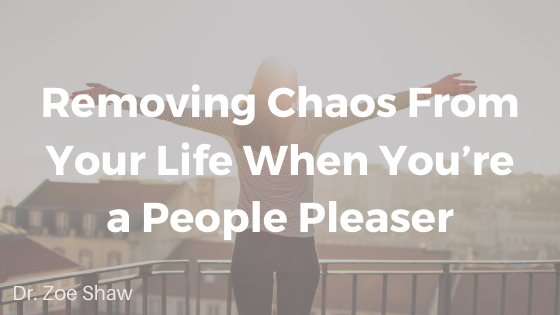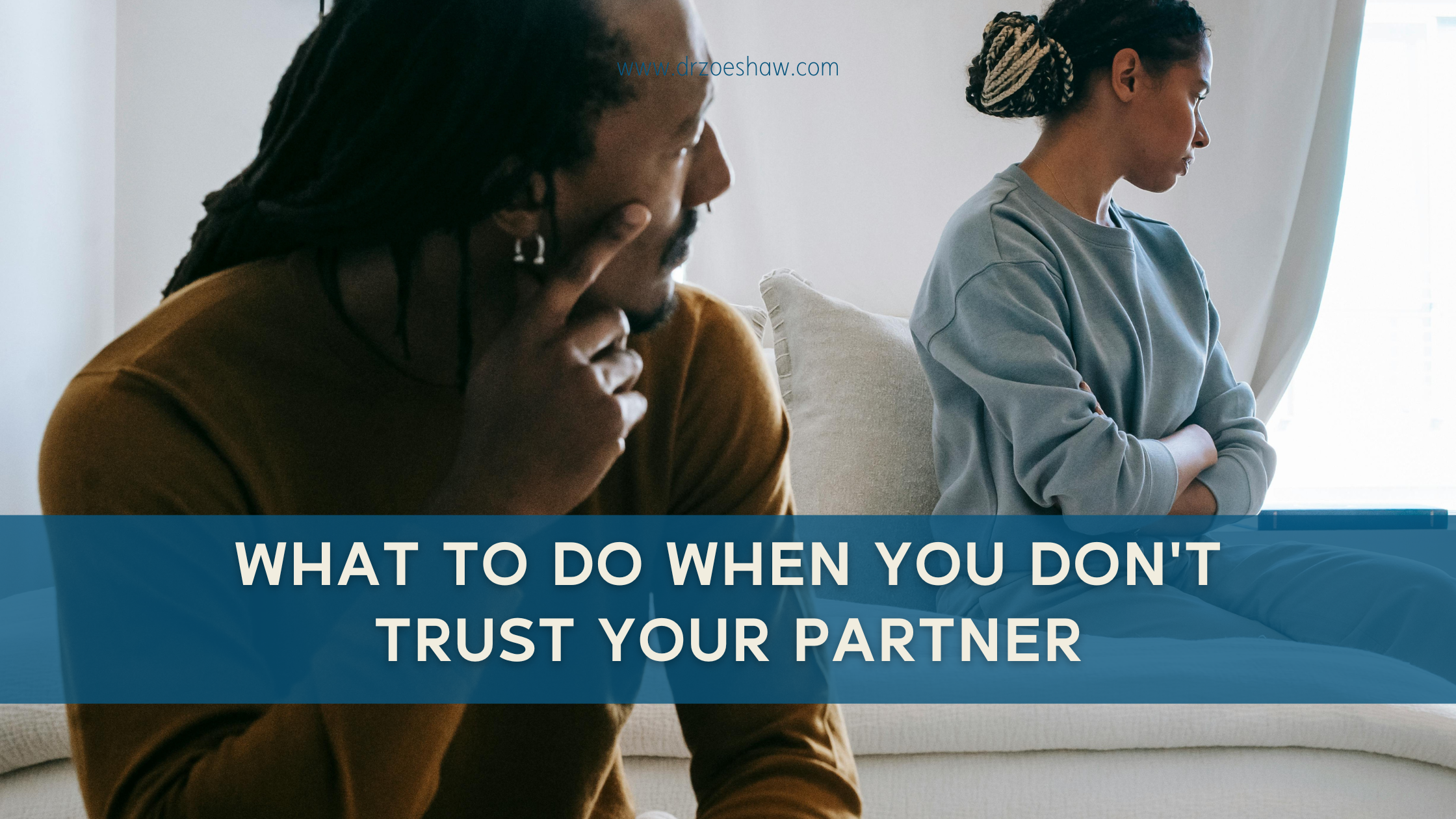This is one of those gut punch kind of topics—one that doesn’t get talked about enough. What do you do when you don’t trust your partner? Not when you feel annoyed with them, not when you have a little miscommunication, but when your gut says something’s not right, and then your experience confirms it.
Now, let me also say this clearly. If you don’t trust someone, you shouldn’t be in a relationship with them. But I also know it is not that simple.
I know it is way more complicated than that, because we don’t live in these theoretical bubbles, right? We live in houses, we have shared mortgages, we have blended families, we have joint retirement plans. We have decades of intertwined memories. And so it’s way easy to just say you shouldn’t be in a relationship with someone if you don’t trust them.
But you might have made a commitment long before you had the wisdom or the self-awareness to know what you were signing up for. And here you are now, you find yourself in a relationship where trust has been broken. Maybe it’s been broken for years, maybe you just found out it’s been broken.
But everything else, all those other things, are still in place and they matter. And so if you’re in that space, I want to acknowledge something first up front.
Acknowledging the Pain and Grief
This is one of the most painful, emotional spaces to be in. It’s grief, right? You are grieving. It’s a kind of grief. It’s the death of a relationship that you thought you had.
It’s the loss of safety. It’s the fear of what happens next. What does this mean? It’s the isolation of knowing your secret, because so often, this is the thing that you carry by yourself.
You carry alone and it can feel isolating. And there are plenty of reasons why you might not want to tell other people about it. Because yes, you are in this relationship, but this relationship is also connected to other relationships and it’s complicated.
So today, I want to honor that pain. I want to honor that grief. And I also want to give you some takeaways to help you move forward, whether you stay or you go, because this isn’t really about them.
It’s about you. It’s about your healing and your power. So let’s start.
Step 1: Practice Radical Honesty
Stop pretending that your partner is someone else. Let’s be real. Let’s be real in the most emotional, raw way. We get into the most emotional turmoil when we try to reconcile who someone is with who we want them to be. And when we’re constantly expecting them to be somebody we’re not, we are just getting devastated over and over again.
So if your partner has shown you through repeated behaviors that they are not trustworthy, then your healing starts with radical honesty. And that means seeing them clearly without your hope, without your fantasy, without your fear of being alone, coloring the truth of what is. So you’ve got to ask yourself, what patterns have they shown you? History is definitely a stronger predictor of anything.
So what do you already know that they have shown you? Have they lied? Have they hidden money? Have they been emotionally disloyal or sexually unfaithful? Or maybe they simply don’t take your needs seriously. That is a breach of trust. Whatever it is, your job is to stop explaining it.
Stop twisting yourself into a pretzel trying to find logic for their betrayal. Instead, you’ve got to face the truth with clear eyes and steady feet. You can do that.
We can’t begin to heal in the fog of self-deception. You’ve got to be able to see clearly and move wisely.
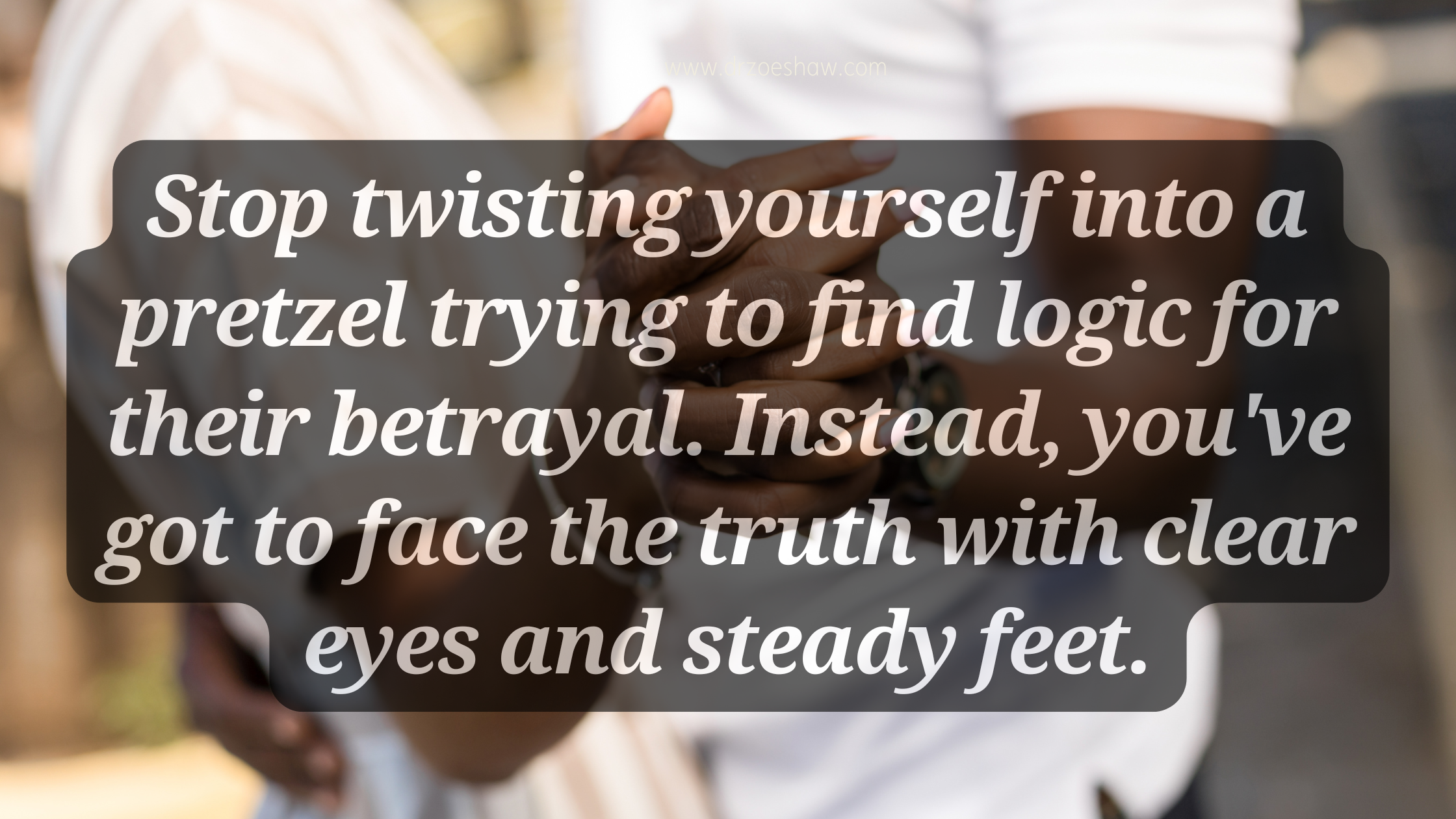
Step 2: Detach Your Emotional Stability From Their Behavior
When trust is broken, you’ve got to detach your emotional stability from their behavior. This one is hard, but it’s crucial. Because when someone breaks our trust, it feels like the floor has fallen out from under us. It can feel like you were on a roller coaster or you were on a merry-go-round and you got flung off and you’re standing there and watching everybody just go like the world has continued, like nothing happened.
You may feel like you have to walk on eggshells. You might be scanning for signs that it’s happening again. This is almost like a betrayal PTSD.
You might obsessively seek reassurance. You might hope that if they could say the right thing, that it would make you stop feeling so anxious. And so you might be pestering them or you might be asking questions over and over again, wishing for the right answer that would fix all of this.
But here’s the truth. Your emotional stability can’t come from another human being. And even more important, your emotional stability can’t come from the person who’s not at least in this moment, not right now.
It can’t be based on whether they text you back, whether they tell you the whole truth, or whether they’re finally doing it better. Because that is really just a yo-yo life, right? You’re always, your emotions are just flinging back and forth based on whatever’s going on in the moment. And when we rely on other people for our emotional stability, we really won’t have it.
We will not have it. So instead, your peace has to come from something higher. I believe that our peace comes from God, that when we continue to seek peace from Him, we can actually attain that.
From a relationship where your identity, your worth, your sanity aren’t on the auction block of somebody else’s behavior, right? Where it’s freely given. You’ve got to detach your inner world from their outer actions. And it doesn’t mean you don’t care.
It means that you care for yourself more.
Step 3: Set Clear, Consequential Boundaries
You got to set clear, consequential boundaries. That’s a hard one because so many people feel like, I can’t really set a boundary because they’re just going to break it. And then what do I do?
And this is where we stop talking and we start acting. So for example, if your partner lies to you, your boundary might sound like, we need a separation while you work through your choices. I’m not willing to stay in an intimate relationship without trust and transparency.
Or maybe they were hiding communication with an ex or they weren’t honest about a financial decision and so you’re hurt and you’re finding it hard to trust them right now. But you’re not ready to end the relationship, right? So here’s an example of another boundary that you can set. You can say something like, I want to rebuild trust with you, but I need honesty and openness from you moving forward.
Right now, I don’t feel emotionally safe when I’m unsure about what’s true. So I’m going to take a step back from sharing certain parts of myself and our plans until I see consistency and your actions matching words over time. Because consistency and actions matching words over time is what builds trust.
This isn’t punishment, it’s me protecting my heart while we work through this. And this works because it clearly defines your needs, which is safety, right? And honesty. It takes ownership of your limits without blaming or shaming your partner.
And it emphasizes your intention to stay engaged in the relationship while you create space that you deserve for healing. It sets a temporary and measurable boundary so you’re letting your partner know that you’ll reinvest emotionally when trust-building behaviors show up consistently. Remember, what matters most is that your boundary has a consequence.
Not a threat, but a clear next step that you’re going to take to take care of yourself if the behavior continues. This is not an ultimatum. And I believe in ultimatums because I really just believe ultimatums are boundaries, as long as we are actually willing to follow through on them.
But this is a clear boundary. I am no longer willing to be in a relationship where my partner is not telling me the truth. Now, are we ending the relationship? Not necessarily.
Do we need to distance or separate ourselves from the relationship? Yes. Remember, because boundaries without consequences are just wishful thinking. Now, there are plenty of ways that we can separate ourselves in relationship.
And what I don’t suggest you do is stonewall, meaning where all of a sudden you’re just going to ignore them and stop talking to them. No, you’re going to have an adult conversation with them and let them know this is what’s happening. And so I have to remove myself in this way from the relationship if this continues to happen.
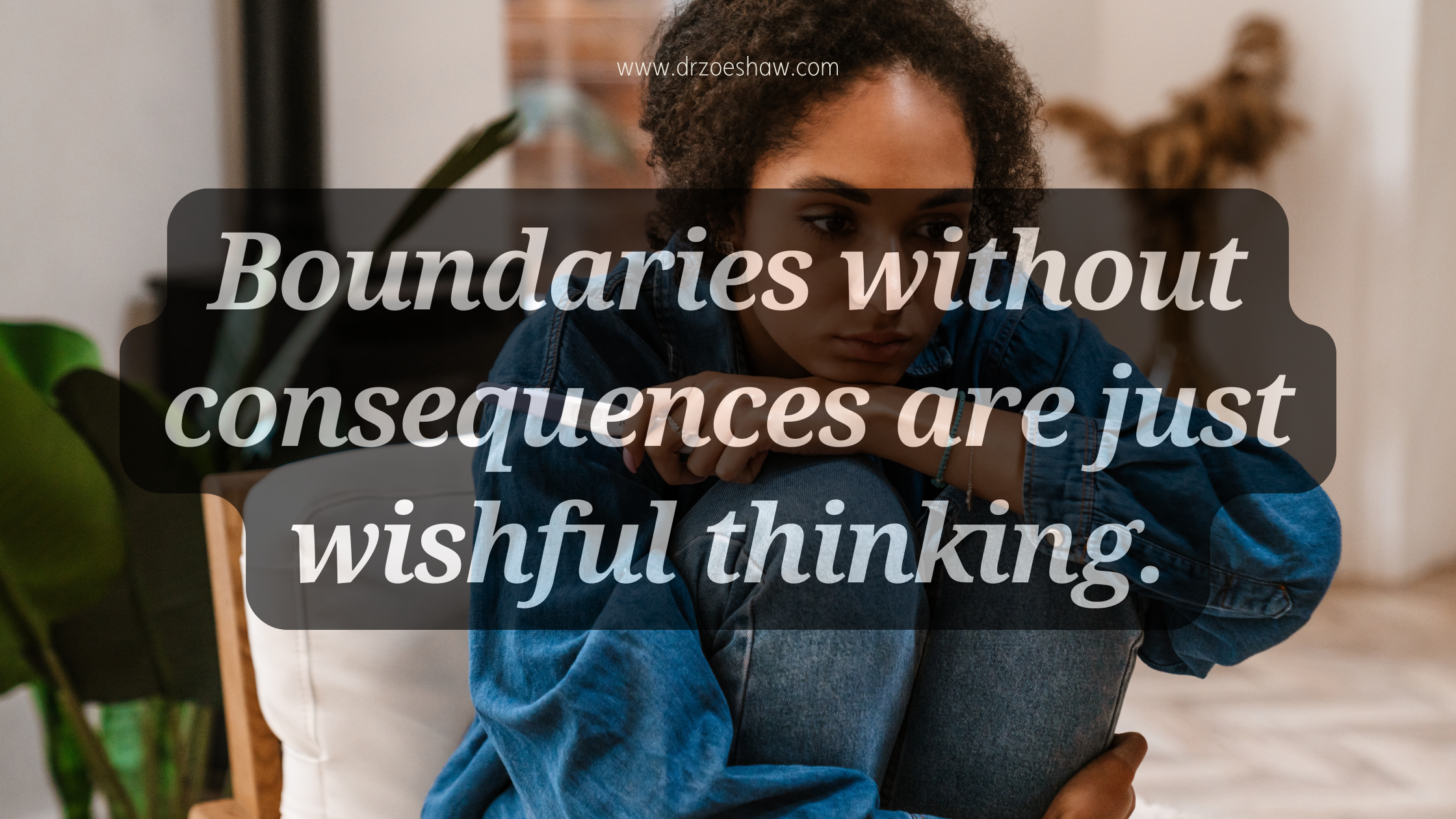
Step 4: Reclaim Your Agency and Stop Waiting
You’ve got to reclaim your agency and stop waiting. Distrust puts us in a holding pattern. We wait for them to come clean, change, confess, or reassure us.
And in that waiting, we shrink. But you don’t have to wait to reclaim your agency. You don’t need their participation to begin your healing.
You can get into therapy, you can rebuild your support system, you can set financial goals, or you can make an exit plan. Even if you’re not sure you’ll use it, you can make an exit plan. Taking action doesn’t mean you’re giving up.
It means you’re choosing yourself while you figure it out. You’re not powerless here. Even if you choose to stay in the relationship, you are not powerless.
Don’t let their behavior write your story.
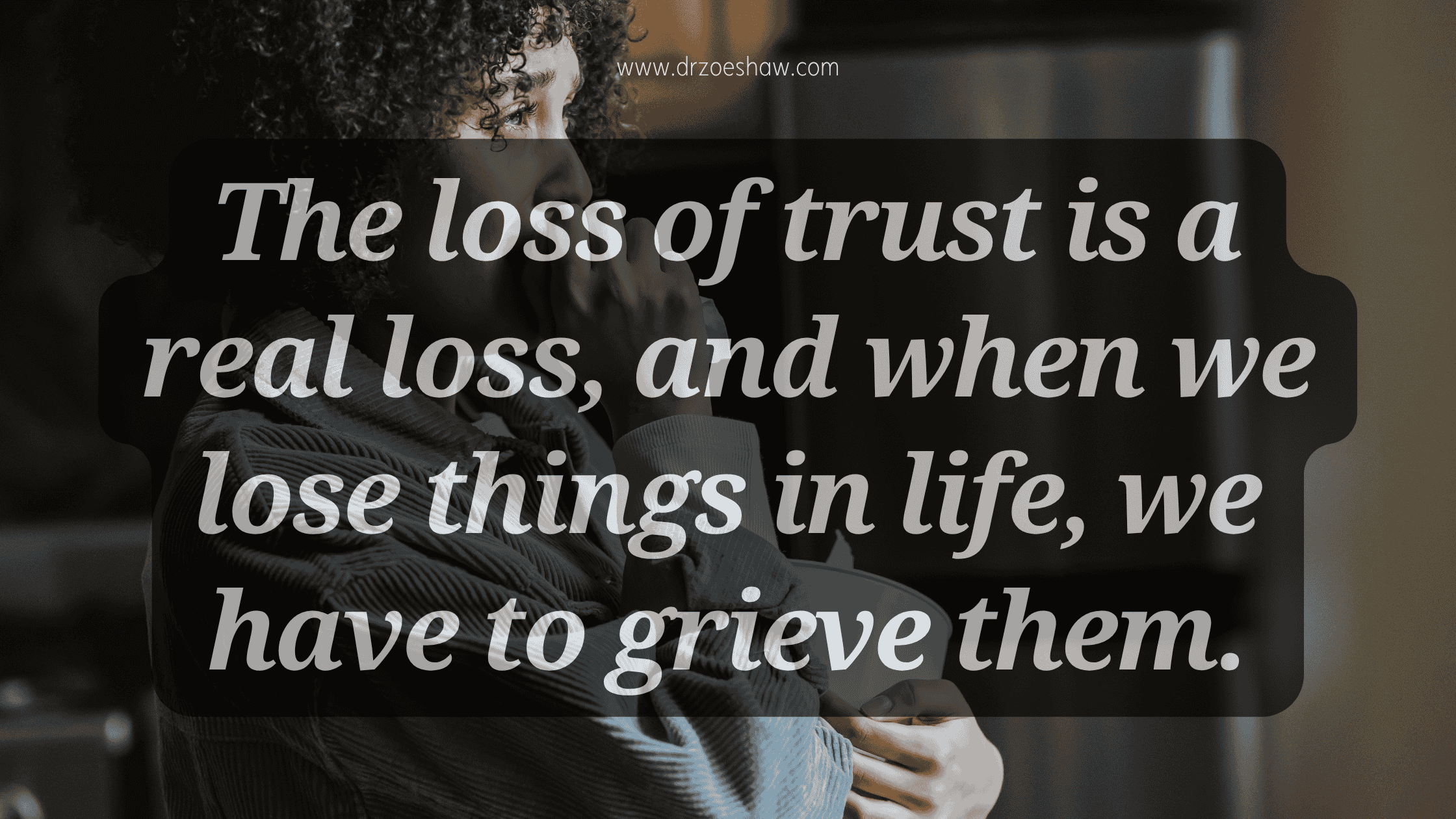
Step 5: Give Yourself Permission to Grieve
You need to give yourself permission to grieve. You’ve got to give yourself permission to grieve and then choose.
The loss of trust is a real loss, and when we lose things in life, we have to grieve them. So let yourself grieve. Let yourself be sad.
Let yourself mourn the version of the relationship that you thought you had. Mourn the future that you dreamed of, where trust wasn’t broken. Mourn the security that is now in question in your life.
But then after that mourning comes a choice. We’re always choosing, right? You may choose to stay. You may choose to rebuild.
You may choose to renegotiate the terms of your relationship. Or you may choose to walk away. You don’t need to think about that now, but either choice is valid, and both are brave.
What’s not healthy is staying in a state of paralysis and not responding when trust has been broken, where you do nothing, where you keep hoping, where you keep hurting, where you keep hiding. That is not healthy. Eventually, you must choose.
Do I want to build trust again, or do I need to release this relationship so I can trust myself again? Now remember what I said. You can build your own trust with yourself within the relationship, but ultimately those questions are going to have to be asked and answered.
Finding Strength in Sacred Work
Remember, emotional stability only comes from God. It doesn’t come from other people. Yes, others trigger us. No, it’s not okay or healthy, nor should you ever accept bad treatment or abuse, but your emotional stability does not have to depend on another person.
It comes from God. It’s not easy work, my friend, but it is sacred work. When trust is broken, it’ll either be that thing that shatters you, and sometimes it shatters you for a moment, or it’s going to be the thing that wakes you up to a deeper strength, a clearer vision of who you are, and a richer connection with God.
So whether you’re reading to this right now through tears, rage, numbness, I see you. You’re not crazy. You are not too much.
You are also not alone. You’re strong, even in this very, very difficult place.
Let’s keep getting stronger together. Until next time, stay brave, stay true, reach out to me if you need to.
You’ve got this.
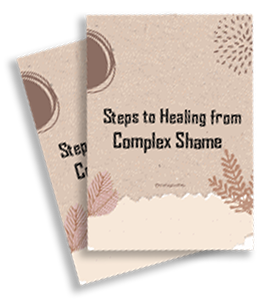
Subscribe and Heal your Relationships.
You deserve a healthy, loving relationship and it starts with You. Learn how to untangle
Complex Shame™ and co-dependency to finally have the beautiful, secure relationship with
yourself and others that you’ve always wanted.
Subscribe and as a thank you, I’ll send you the Steps to Healing from Complex
Shame™.
